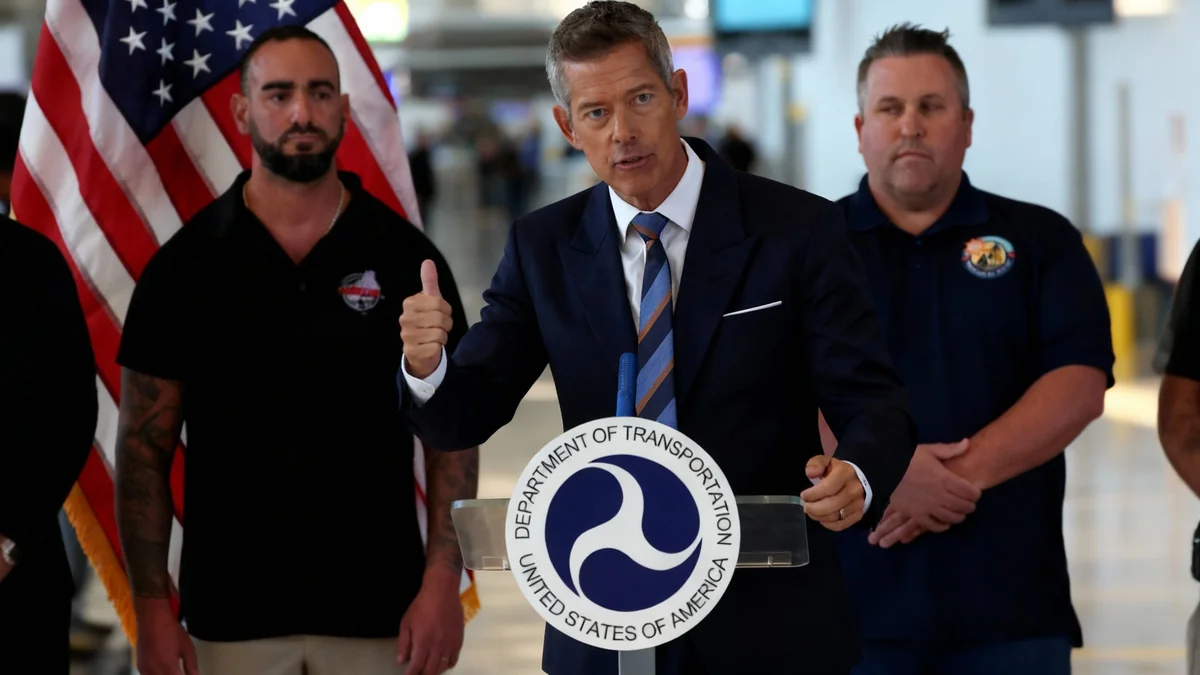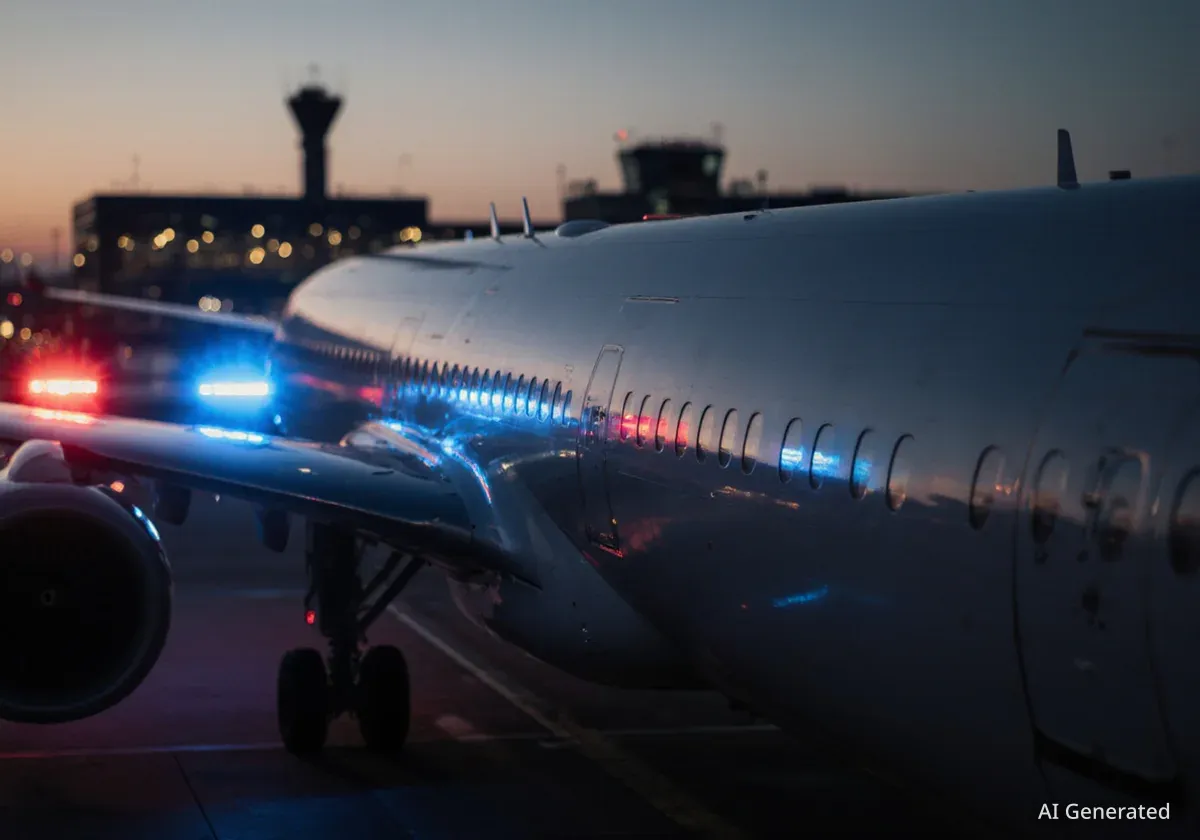The United States Department of Transportation has revoked its approval for 13 flight routes operated by Mexican airlines, a significant escalation in an ongoing aviation dispute between the two countries. The decision, announced Tuesday, directly impacts major carriers including Aeromexico, Volaris, and Viva Aerobus.
In addition to the route cancellations, the U.S. government has halted all combined passenger and cargo flights by Mexican airlines from Mexico City's Felipe Angeles International Airport (AIFA) to the United States. The move follows U.S. assertions that Mexico has not been compliant with a bilateral aviation agreement for several years.
Key Takeaways
- The U.S. Department of Transportation has revoked approval for 13 routes operated by Aeromexico, Volaris, and Viva Aerobus.
- All passenger and cargo flights from Mexico City's Felipe Angeles International Airport (AIFA) to the U.S. on Mexican carriers have been canceled.
- The action stems from a dispute over Mexico's alleged non-compliance with a bilateral aviation agreement since 2022.
- Travelers with bookings on the affected routes are advised to contact their airlines for re-accommodation information.
A Sweeping Decision Impacts Major Carriers
The order from the U.S. Transportation Department introduces several restrictions on Mexican air carriers. The primary action is the immediate disapproval of 13 specific routes, some of which were already in operation while others were planned services.
Furthermore, the growth of combined passenger and cargo services, often referred to as "belly cargo," from Mexico City's main Benito Juarez International Airport (MEX) has been frozen for Mexican airlines. This prevents them from expanding their cargo capacity on existing passenger flights to the U.S. from that hub.
The department is also proposing a more stringent measure: a complete prohibition on Mexican passenger airlines transporting any belly cargo between Juarez airport and the United States. If finalized, this rule would take effect in approximately three months, further limiting the operational capabilities of these carriers.
The Heart of the Dispute
U.S. officials state that these actions are a direct response to what they describe as Mexico's failure to adhere to international agreements. According to the Transportation Department, Mexico has been out of compliance with a bilateral aviation agreement since 2022.
Background of the Conflict
The core of the issue dates back to 2022, when U.S. authorities say Mexico rescinded flight slots belonging to U.S. passenger carriers. At the same time, U.S. all-cargo airlines were compelled to relocate their operations, moves that the U.S. considers a violation of the existing aviation treaty between the nations.
Transportation Secretary Sean Duffy framed the decision as a necessary step to ensure fair competition and adherence to international commitments.
"Until Mexico stops the games and honors its commitments, we will continue to hold them accountable. No country should be able to take advantage of our carriers, our market, and our flyers without repercussions," Duffy stated.
The U.S. government contends that Mexico has "illegally canceled and froze U.S. carrier flights for three years without consequences," leading to the retaliatory measures announced this week.
Travelers Caught in the Crossfire
The sudden cancellations are expected to disrupt travel plans for numerous passengers. The Department of Transportation has warned that the ongoing non-compliance by Mexico "may impact travel plans for American citizens" and urged affected individuals to reach out to their airlines directly for information on refunds or rebooking.
The specific routes affected by the order are:
- Aeromexico: Mexico City (MEX) to San Juan, and Mexico City (AIFA) to Houston and McAllen, Texas.
- Volaris: Mexico City (MEX) to Newark, New Jersey.
- Viva Aerobus: Nine proposed routes from Mexico City (AIFA) to Austin, New York, Chicago, Dallas, Denver, Houston, Los Angeles, Miami, and Orlando.
Impact by Airport
The order completely halts all services by Mexican carriers from the newer Felipe Angeles International Airport (AIFA) to the U.S. and freezes cargo growth from the older Benito Juarez International Airport (MEX).
At the time of the announcement, Mexico’s transportation ministry and the three affected airlines—Aeromexico, Volaris, and Viva Aerobus—had not issued public comments on the matter.
A Pattern of Escalating Tensions
This week's actions are part of a broader trend of increasing pressure from the U.S. on Mexican aviation authorities. Just last month, the Transportation Department ordered Delta Air Lines and Aeromexico to terminate their joint venture agreement.
That partnership allowed the two airlines to coordinate schedules, pricing, and capacity on U.S.–Mexico flights. The U.S. cited "ongoing anticompetitive effects in U.S.-Mexico City markets" as the reason for dissolving the alliance, stating it gave the pair an unfair advantage.
The firm stance is not limited to Mexico. Secretary Duffy recently warned European governments against imposing unilateral travel restrictions, signaling that Washington is prepared to enforce international agreements globally. This recent action against Mexican carriers underscores that position, demonstrating a willingness to impose significant operational penalties to enforce compliance.





